Welcome Daniel!
Welcome dinner party for Daniel Bisericaru from Francesco Trotta‘s lab, who will work with us at CarboHyde for several months on novel drug delivery systems – nanosponges targeting different organs.
Welcome Daniel!
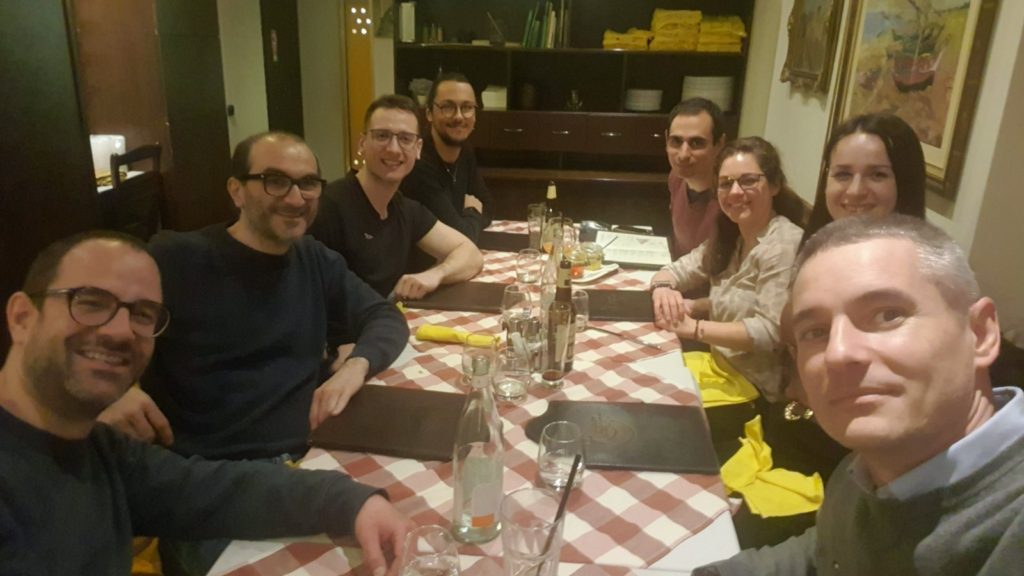
Welcome dinner party for Daniel Bisericaru from Francesco Trotta‘s lab, who will work with us at CarboHyde for several months on novel drug delivery systems – nanosponges targeting different organs.
Welcome Daniel!

Dr. Atsou Ochi recently published his invention related to methods for reprogramming somatic cells into pluripotent stem cell-like cells. Such cells may express pluripotency-inducing genes, including Oct4, Nanog, and Sox2, without introducing exogenous genes, proteins, or chemicals. The discovery that the inhibition of mechanosensitive and stretch-activated ion channels in somatic cells specifically activates pluripotency-inducing factor genes inspired the cell reprogramming culture methods in which somatic cells were incubated with the inhibitor, GsMTX4, against mechanosensitive and stretch-activated ion channels, cultured on the soft hydrogel surface, or treated with cholesterol depletion substance, methyl-beta-cyclodextrin (MβCD).
Described methods produce pluripotent stem cell-like cells and subsequently re-differentiated cells, which include adipocytes, osteocytes, and neuronal cells. Methods may be combined to increase the efficiency of somatic cell reprogramming.
To take the next step in development, Novoxyne and CarboHyde started a multiple-staged collaboration project to assess the effects of various cyclodextrins as reprogramming agents of somatic cells, components of stem cell differentiation, and future tools in stem cell-based therapies.
Novoxyne and Dr Ochi will focus on comparing the effects of different cyclodextrin derivatives on cell redifferentiation, while CarboHyde’s expertise will be used to select and customize this project’s best-working cyclodextrin derivatives.
“We have always had a deep interest in using carbohydrates in novel ways of biotechnology. In fact, two out of our in-house pipeline programs are developed in these directions. Our collaboration with Novoxyne is likely to become a strong third one in a field that holds both great promise and huge challenges in the future of pharmaceutics. I am sure that this collaboration will be mutually rewarding and may open novel insights in the application of cyclodextrins in biotechnology” said CarboHyde’s CEO József Tóth about this upcoming collaboration.
ABOUT CARBOHYDE
CarboHyde is a private preclinical pharmaceutical start-up specializing in developing carbohydrate-based APIs. Our team consists of a small group of seasoned scientists with over 50 years of cumulative experience in the field of carbohydrate chemistry, analysis and pharmaceutical development. The company’s core focus is neurodegenerative diseases, yet we also have other pre-clinical programs in various unmet medical indications. Fully embracing the pharmaceutical development ecosystem, we utilize contract research organizations (CRO) and other companies focusing on CMC and clinical development to make our drug development process efficient. CarboHyde’s management team has extensive experience in medicinal chemistry, marketing, and pharmaceutical development. In addition, CarboHyde is supported by experienced advisers, consultants, and carbohydrate veterans.
ABOUT NOVOXYNE Novoxyne is a research company founded by Atsuo Ochi dedicated to discovering cures to human diseases. We have developed therapeutic fusion proteins based on the checkpoint receptor ligands and cytokines. We have also developed a groundbreaking reprogramming technology that converts somatic cells to stem cells without gene transfection. Our reprogramming technology quickly makes the limitless number of stem cells from any somatic cells and stem cell therapy will become very accessible and safe. No gene transfection, no embryonic stem cell, and no purification of mesenchymal stem cell is necessary for our technology to prepare a large number of stem cells.
Fresh brains are always welcome at CarboHyde, thus we are particularly happy to host Nina Burduja student of Antonino Mazzaglia from Università degli Studi di Messina for 6 months. Nina’s project is to create #biodegradable#nanomaterials based on #cyclodextrin as molecular carriers for bio-delivery and chemo and bio species monitoring.
Nice to have you on board, Nina, good luck with your studies!
Milo Malanga, László Ragányi, Kristóf Felegyi, Mihaly Balint, Tamas Sohajda, Tamás Vargadi, Gergely Toth

Tamas Sohajda is delighted to share his upcoming keynote at the Innovations in encapsulation 2023 event organized by The Formulation Science and Technology group (FSTG) of the Royal Society of Chemistry, Dr. Shashi Rudrangi and Dr. Cuross Bakhtiar, where he will talk about Innovations in cyclodextrin encapsulation and how we see the future of this field at CarboHyde.
This will be held on Thursday, 20th April 2023, at Burlington House, London, United Kingdom.
Dr. Tamás Sohajda, Member of the Scientific Advisory Board, CarboHyde, and Former CEO of CycloLab, Hungary. – Innovations in cyclodextrins encapsulation: possibilities and challenges. (This lecture will cover advancements in cyclodextrin encapsulation of pharmaceutical, nutraceuticals, and cosmetics)

Last week our CSO, Milo Malanga, had the privilege to attend the kick-off meeting of the GENEGUT consortia (a highly specialized, Horizon Europe team developing novel tools for the oral delivery of RNA to treat Crohn’s disease in Cork.
He also met the team of Mary McNamara (https://www.tudublin.ie/research/postgraduate-research/graduate-research-school/meet-the-team/marymcnamara.html) at Technological University Dublin to discuss expanding potential collaborations and visited the Astrazeneca site in Cambridge, UK.
We are grateful for all of your hospitality and look forward to developing fruitful relationships in 2023.
Milo Malanga and Tamas Sohajda delivered a talk during the annual seminar of the “drug substance analysis” group of the Hungarian Academy of Sciences yesterday. We are grateful for the invitation and stimulating discussion that followed the presentation.
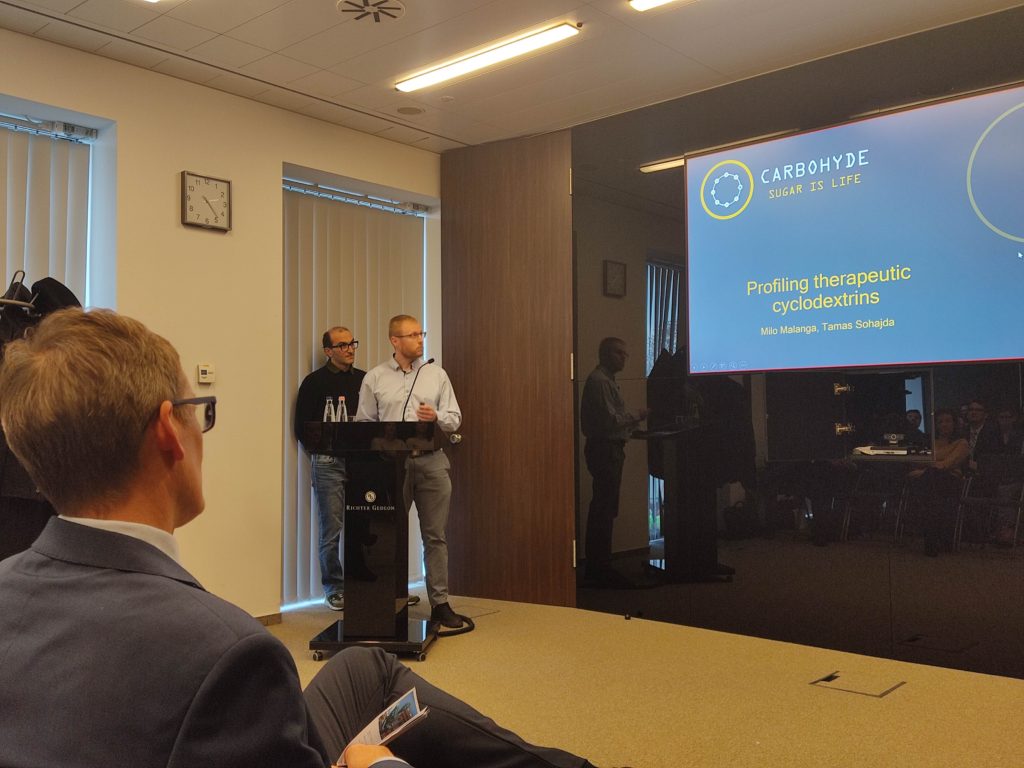
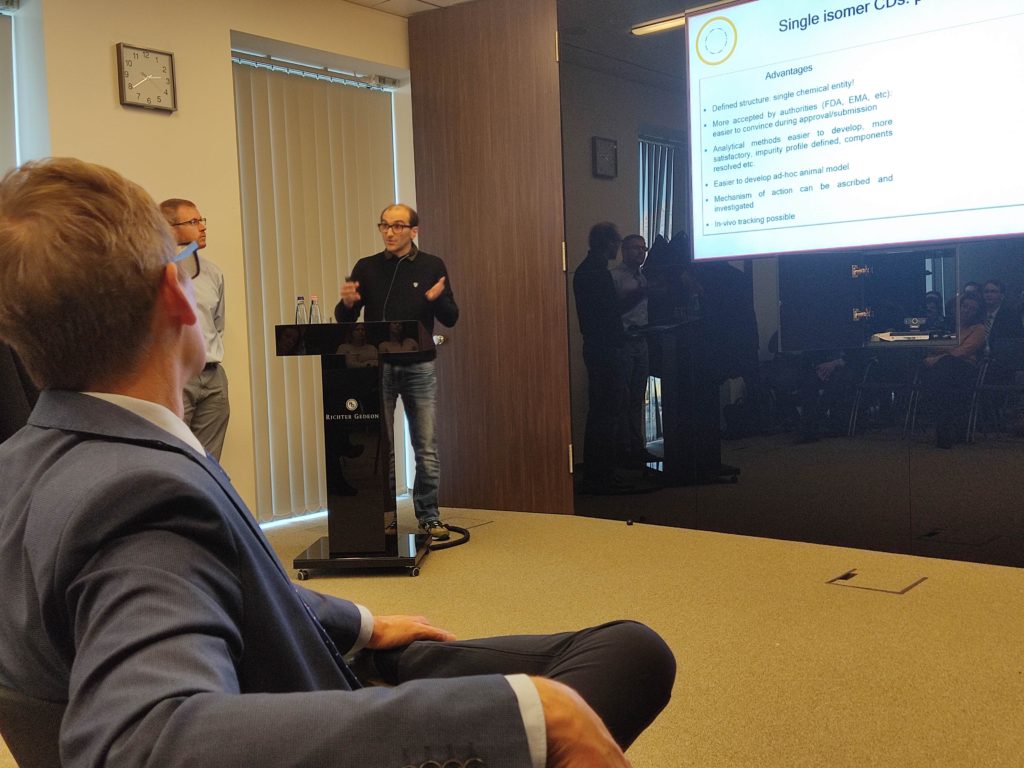
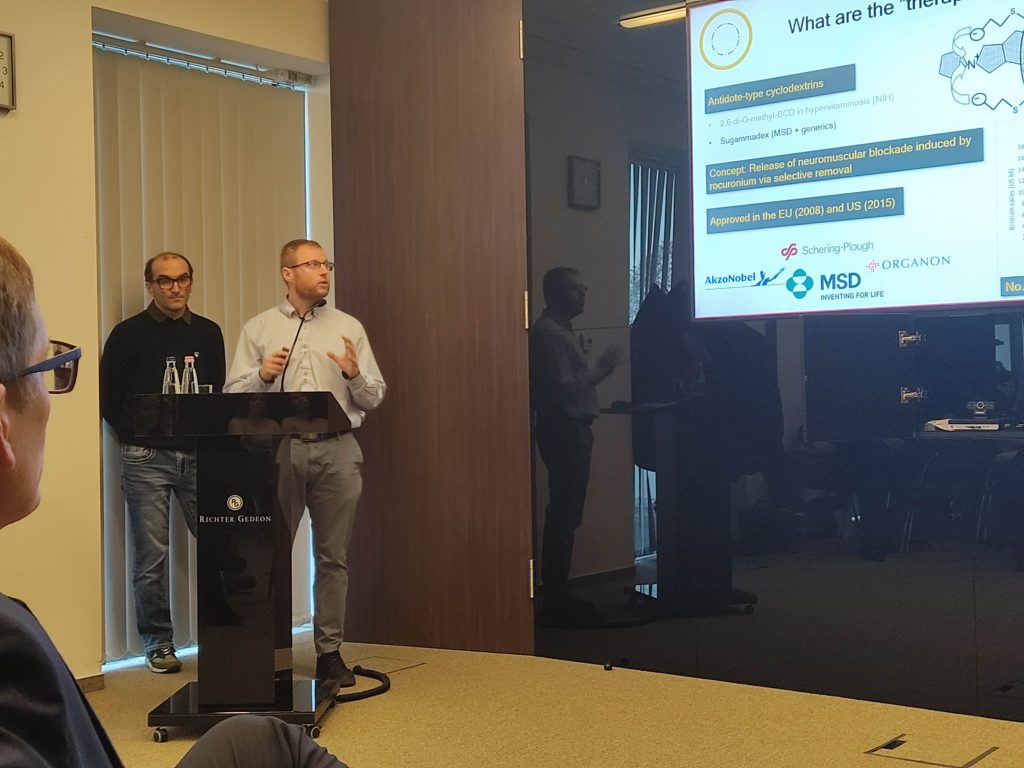
Our CSO, Milo Malanga PhD spent the last week at Università degli Studi di Torino in the lab of Francesco Trotta, supporting students in their chemistry visions and creating nanosponges together as well as delivering a scientific seminar on the uses of cyclodextrin in biotechnology. We will explore together the potential uses of the created compounds as novel drug delivery systems in the coming months. Next year CarboHyde will host students from the Trotta lab to continue the synthetic work and create new compounds supporting our collaborative R&D program.

We participated at the biggest pharmaceutical exhibition, CPhI Worldwide in Frankfurt in November 2022, represented by Gergely Tóth, CFO and Tamas Sohajda, board member.
This was the first international exhibition where CarboHyde participated in looking for new partners, suppliers, and CMOS for our upcoming programs. The event was a huge success and triggered several collaborations on the R&D and commercial sides.

Recently, our CSO, Milo Malanga had the privilege to deliver a talk about using cyclodextrins in biotechnology at the annual meet of the French Cyclodextrin Society (http://www.clubcyclodextrines.fr/en) and visit several prestigious labs in France to discuss strategic, long-term research collaborations. Thank you for hosting us Sophie Fourmentin at Université du Littoral Côte d’Opale, Bernard Martel at University of Lille 1 Sciences and Technology, Eric Monflier and Sebastien Tilloy at Université d’Artois and Matthieu Sollogoub at Sorbonne Université.
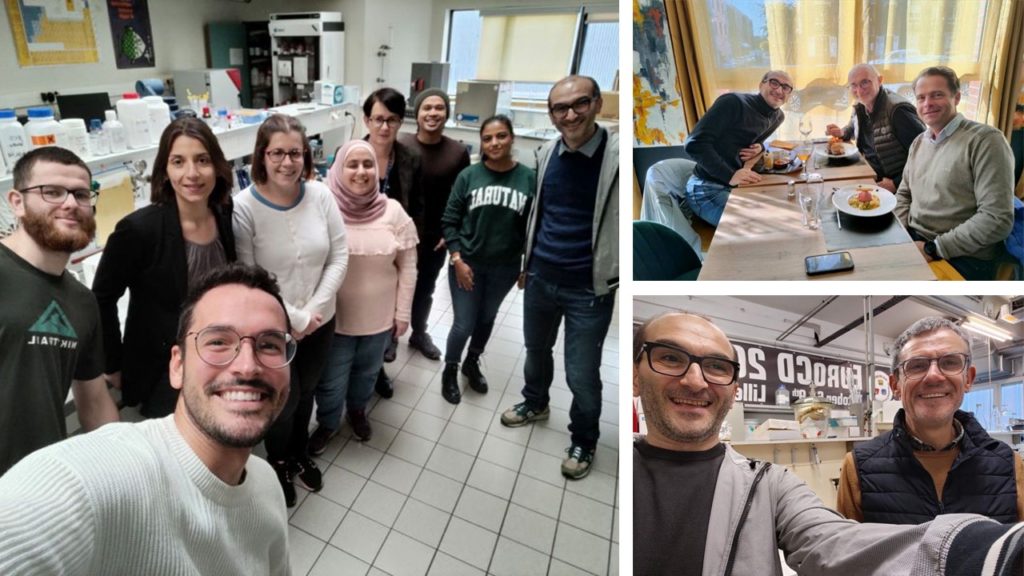
Dr. Chris Kevil’s laboratory at LSU Health Shreveport (LSUHS) has discovered that a clinically approved cyclodextrin-based drug called Sugammadex can act as a hydrogen sulfide donor that restores vasoactive hydrogen. This innovation has already gone through initial in vivo testing with promising results.
To take the next leap in development, LSUHS and CarboHyde will start a multiple-staged collaboration project to assess the effects of various cyclodextrins as potential hydrogen sulfide (H2S) donors in methamphetamine-mediated vascular diseases and for various other cardiovascular diseases. Methamphetamine users face a significantly higher risk for cardiovascular disorders, according to a major study published by the Journal of the American Heart Association earlier this year. The Kevil lab has also recently published that chronic methamphetamine use causes cardiovascular dysfunction due to reduced hydrogen sulfide. This poses an additional threat and possible treatment approach for those who use or have already stopped using meth.
LSU Health Shreveport and the Kevil laboratory will focus on comparing the effects of different cyclodextrin derivatives in blood sulfide levels and test the compounds in vitro and in different animal models. CarboHyde’s expertise will be used to select and customize this project’s best-working cyclodextrin derivatives.
“This is exactly the type of research our minds are formed around. We simply admire innovative ideas and out-of-the-box applications of cyclodextrins and other carbohydrates. We keep looking for opportunities to add our knowledge to drive such studies forward. I am sure our collaboration with LSU Health Shreveport and Dr. Kevil will be mutually rewarding and may open novel insights in the application of cyclodextrins in cardiovascular diseases,” said CarboHyde’s CEO József Tóth about this upcoming collaboration.
“Collaboration with carbohydrate expertise at CarboHyde represents a unique opportunity to develop innovative molecules and modalities to treat methamphetamine and other cardiovascular diseases, said Dr. Chris Kevil.

ABOUT CARBOHYDE
CarboHyde is a private preclinical pharmaceutical start-up company specializing in the development of carbohydrate-based APIs. Our team consists of a small group of seasoned scientists with over 50 years of cumulative experience in the field of carbohydrate chemistry, analysis and pharmaceutical development. The company’s core focus is neurodegenerative diseases, yet we also have other pre-clinical programs in various unmet medical indications. Fully embracing the pharmaceutical development ecosystem, we utilize contract research organizations (CRO) and other companies focusing on CMC and clinical development to make our drug development process efficient. CarboHyde’s management team has extensive experience in medicinal chemistry, marketing, and pharmaceutical development. In addition, CarboHyde is supported by experienced advisers, consultants, and carbohydrate veterans.
ABOUT LSU HEALTH SHREVEPORT LSU Health Shreveport (LSUHS) is one of two health sciences centers of the Louisiana State University (LSU) System and home to one of only 155 medical schools in the nation accredited by the Liaison Committee on Medical Education (LCME). The primary mission of LSUHS is to teach, heal, and discover in order to advance the well-being of the state, region and beyond. LSU Health Shreveport encompasses the School of Medicine, School of Graduate Studies and School of Allied Health Professions, Graduate Medical Education (GME), and a robust research enterprise. More than 1,000 students are enrolled in degree programs at any one time, and nearly 600 residents and fellows are enrolled in LSUHS training programs while treating patients at participating sites (hospitals and clinics) throughout north Louisiana. At the heart of LSU Health Shreveport is a strong faculty that includes a number of nationally and internationally acclaimed physicians and scientists. More than 600 strong, they lead research efforts, educate students, train residents and fellows, and provide primary and specialty care to patients throughout the region. Research is a core aspect of our institution’s mission and values, and LSU Health Shreveport and is committed to fostering collaboration and discovery to advance the knowledge and practice of science and medicine. Faculty, staff and students are actively engaged in research across a variety of biomedical areas that ranges from traditional basic science research in the lab to translational research and testing of new treatment and prevention methods in clinical trials. LSU Health Shreveport is home to six research centers, four of which are designated Centers of Research Excellence by the Louisiana Board of Regents, that concentrate on public healthcare needs of the state and region, including cancer, cardiovascular disease, virology, immunology, neuroscience, and addiction. LSU Health Shreveport has established strong community support and is committed to fostering a culture of diversity and inclusion that promotes mutual respect for all. For more information, visit www.lsuhs.edu